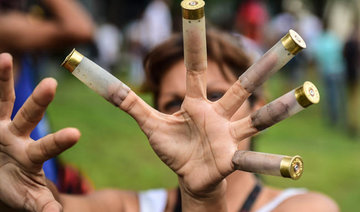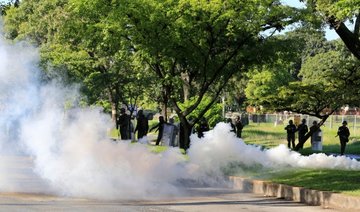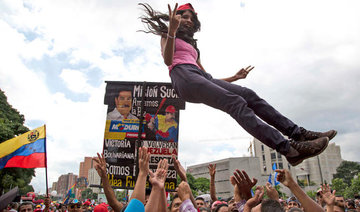GENEVA: The UN decried Tuesday “widespread and systematic use of excessive force” against demonstrators in Venezuela, saying security forces and pro-government groups were responsible for at least 73 protester deaths.
Presenting the preliminary findings from an investigation conducted in June and July, the UN rights office described “a picture of widespread and systematic use of excessive force and arbitrary detentions against demonstrators in Venezuela.”
“Witness accounts suggest that security forces, mainly the National Guard, the National Police and local police forces, have systematically used disproportionate force to instil fear, crush dissent, and to prevent demonstrators from assembling, rallying and reaching public institutions to present petitions,” the rights office said in a statement.
“Government authorities have rarely condemned such incidents,” it stressed.
Venezuela, which is suffering from an acute economic crisis marked by shortages of basic goods, has experienced four months of street demonstrations against President Nicolas Maduro that have left 125 people dead.
After receiving no response to repeated requests for access to Venezuela to investigate the situation in the country, UN rights chief Zeid Ra’ad Al Hussein deployed a team of human rights officers to monitor the country remotely.
The investigators conducted 135 interviews between June 6 and July 31 with victims and their families, witnesses, civil society organizations, journalists, lawyers and doctors, among others.
“Since the wave of demonstrations began in April, there has been a clear pattern of excessive force used against protesters,” Zeid said in the statement.
“Several thousand people have been arbitrarily detained, many reportedly subjected to ill-treatment and even torture, while several hundred have been brought before military rather than civilian courts,” he said, stressing that “these patterns show no signs of abating.”
According to the preliminary findings, security forces were allegedly responsible for at least 46 of the protester deaths, while pro-government armed groups were behind 27.
It remained unclear who was behind the remaining deaths, the rights office said.
At the same time, nearly 2,000 people have been injured, while more than 5,050 people have been arbitrarily arrested, with over 1,000 reportedly still in detention, it said.
The rights office also decried “credible reports of cruel, inhuman or degrading treatment by security forces of such detainees, amounting in several cases to torture,” saying tactics included “electric shocks, beatings.., suffocation with gas, and threats of killings, and in some cases threats of sexual violence.”
Zeid warned that “these violations have occurred amid the breakdown of the rule of law in Venezuela, with constant attacks by the Government against the National Assembly and the Attorney-General’s Office.”
“The responsibility for the human rights violations we are recording lies at the highest levels of government,” he said.
UN slams ‘widespread and systematic use of excessive force’ in Venezuela
UN slams ‘widespread and systematic use of excessive force’ in Venezuela

Taliban eye boost in Saudi ties as Kingdom reopens embassy in Kabul

- Saudi Arabia keen to ‘provide all services’ to Afghans, embassy said on Sunday
- Afghanistan’s Taliban government is not recognized by any country in the world
KABUL: Afghanistan’s Taliban government is hoping to boost cooperation with Saudi Arabia as the Kingdom reopened its embassy in Kabul, its Ministry of Foreign Affairs said on Monday.
Saudi Arabia was among a host of nations that withdrew its diplomats from Kabul in August 2021, following the Taliban’s return to power and the withdrawal of US-led forces from Afghanistan. The Taliban are not officially recognized by any country in the world.
Late on Sunday, the Saudi Embassy in Afghanistan announced that the diplomatic mission in Kabul would resume its work.
“Based on the keenness of the government of the Kingdom of Saudi Arabia to provide all services to the brotherly Afghan people, it has been decided to resume the activities of the Kingdom’s mission in Kabul as of December 22, 2024,” it said on X.
The reopening of the Saudi Embassy was welcomed by Afghanistan’s new rulers.
“I consider the resumption of the activities of the Embassy of the Kingdom of Saudi Arabia in Kabul as a step toward further strengthening and expanding bilateral relations between the governments and peoples of the two countries,” Zakir Jalaly, director of the second political division at the Ministry of Foreign Affairs, told Arab News on Monday.
Jalaly said the Kingdom was one of three countries, including the UAE and Pakistan, to recognize the Taliban government during its first rule from 1996 until it was overthrown by the US invasion of Afghanistan in 2001.
“Since Saudi Arabia is an important country at the regional and international levels, the resumption of the embassy’s activities in Kabul will provide ground for expansion of cooperation in various fields,” he added.
Saudi Arabia has continued to provide consular services in Afghanistan since November 2021 and provided humanitarian aid through the King Salman Humanitarian Aid and Relief Center.
“I think the resumption of the Saudi Embassy’s activities in Kabul is a big announcement for the government of the Islamic Emirate facing international isolation as well as for the people of Afghanistan who have been experiencing the negative effects of the political isolation in different aspects of social life,” Naseer Ahmad Nawidy, political science professor at Salam University in Kabul, told Arab News.
The resumption of diplomatic activities will also be helpful for Afghans who are living in Saudi Arabia, which number at around 132,000 people.
“It will also help Afghan traders to do exports and imports from the country. It will also have benefits for Saudi Arabia as it will extend its influence in the region,” Nawidy said.
“I hope other Islamic countries continue to engage with the Afghan government and reopen (their) diplomatic missions in Afghanistan, which will provide ground for cooperation in different areas.”
Bangladesh tells India it wants former PM Hasina back for ‘judicial process’

- Ties between the South Asian neighbors have become fraught since Hasina was ousted and she took refuge across the border
- Bangladesh interim government wants to try Hasina for crimes against protesters, crimes she allegedly committed during her tenure
DHAKA: Bangladesh has told neighbor India that it wants former Prime Minister Sheikh Hasina, who fled to New Delhi in August, back in the country for “judicial process,” the acting head of the country’s foreign ministry said on Monday.
Ties between the South Asian neighbors, who have strong trade and cultural links, have become fraught since Hasina was ousted following violent protests against her rule and she took refuge across the border.
Dhaka’s request to New Delhi on Monday came two weeks after India’s foreign secretary visited Bangladesh and the two countries said they hoped to clear the cloud and pursue constructive relations.
“We sent a note verbale to the Indian government saying that the Bangladesh government wants her (Hasina) back here for judicial process,” Touhid Hossain told reporters, referring to diplomatic correspondence between the two countries.
India’s foreign ministry and Hasina’s son, Sajeeb Wazed, did not immediately respond to requests seeking comment.
The head of Bangladesh’s interim government, Nobel laureate Muhammad Yunus, has demanded that India send Hasina back so that Bangladesh can try her for what it says are crimes against protesters and her opponents, and crimes she is accused of committing during her tenure over the past 15 years.
Yunus has also been upset with Hasina for criticizing his administration from New Delhi.
Hasina faces numerous charges, including crimes against humanity, genocide, and murder, among others. She denies the charges.
Indian Foreign Secretary Vikram Misri visited Dhaka this month and reiterated India’s commitment to pursuing a constructive relationship with Dhaka.
New Delhi has said that Hasina came to India at a short notice for “safety reasons” and continues to remain here, without elaborating.
Saudi previously sought extradition for Germany attack suspect: source close to government

- Saudi Arabia had warned Germany “many times” about Taleb Jawad Al-Abdulmohsen
- He made online death threats and previously had trouble with the law,
RIYADH: Saudi Arabia had previously requested extradition for the Saudi suspect in Germany’s deadly Christmas market attack, a source close to the government told AFP on Monday.
“There was (an extradition) request,” said the source, without giving the reason for the request, adding that Riyadh had warned he “could be dangerous.” The attack on Friday evening killed five people.
Saudi Arabia had warned Germany “many times” about Taleb Jawad Al-Abdulmohsen, the source said. He did not explain in what way he was considered potentially dangerous.
The 50-year-old psychiatrist, who had made online death threats and previously had trouble with the law, also helped Saudi women flee their country.
On social media, Abdulmohsen portrayed himself as a victim of persecution who had renounced Islam and decried what he said was the Islamization of Germany.
He arrived in Germany in 2006 and was granted refugee status 10 years later, according to German media and a Saudi activist.
Retiring US Senator Cardin ‘very concerned’ about Trump and human rights

WASHINGTON: Days before he retires as chairman of the influential US Senate Foreign Relations Committee, Democrat Ben Cardin acknowledged worries about human rights being less of a US priority during President-elect Donald Trump’s second term.
“I don’t want to prejudge, but I am very concerned that protecting human rights may not be as important as other objectives he’s trying to get done,” Cardin told Reuters in an interview, when asked about Trump, a Republican, who returns to the White House on Jan. 20.
Cardin, 81, is leaving Congress at the end of this month after nearly 60 years in public office, the last 18 as a US senator from Maryland. Cardin became chairman of the foreign relations panel unexpectedly in September 2023, after he had announced his retirement, replacing fellow Democrat Bob Menendez, who faced felony bribery charges and was later convicted.
“I didn’t expect that, and I was looking forward to my last two years for many different reasons,” Cardin said.
Cardin is best known as a human rights advocate, notably for co-authoring the Global Magnitsky Act, named for a lawyer who exposed corruption in Russia before dying in prison after being beaten and denied medical care.
Cardin said the Senate, which is about to shift from a thin Democratic majority to Republican control, will have to push back against Trump, as it has in the past, and noted Trump’s willingness to impose Magnitsky sanctions during his first term.
Enacted in 2012, the Magnitsky Act mandated that the US government restrict travel and freeze assets of individuals who committed gross violations of human rights in Russia. In 2016 it became the Global act, extended to rights violators worldwide.
“It’s hard to predict. But Donald Trump, in his first presidency, he used the Magnitsky sanctions quite frequently and that was helpful,” Cardin said.
DEALS OR VALUES?
Cardin said Trump could be too eager to establish relations with autocratic leaders or cede too much in ending Russia’s war on Ukraine. During his successful campaign for re-election this year, Trump vowed to swiftly end the conflict, without giving details on how he might do so.
“So I recognize that Donald Trump likes to think of himself as a deal maker,” Cardin said. “And to me, I want to make sure that we don’t try to get an immediate deal that doesn’t represent our values. So I am concerned that he will look for a shortcut to foreign policy that could compromise some of our values.”
Cardin said he hoped the Senate, where Republicans will have a narrow 53-47 seat majority starting next month, could act as a balance to the incoming president. Trump, in his first term, had sought to slash foreign aid by 50 percent, but dropped the idea after both Republicans and Democrats pushed back.
A staunch supporter of Israel who has faced protests himself during the 14-month-long war in Gaza, Cardin acknowledged that Trump’s second presidency could complicate efforts toward Middle East peace and the eventual creation of a Palestinian state.
But he said the desire of the US and its partners for an alliance to isolate Iran and recent changes in Syria were causes for optimism. “There’s a lot of things happening in the region to give us optimism that we can move past Gaza,” he said.
Trump in his first term, from 2017-2021, pulled the United States out of the UN Human Rights Council, praised autocrats such as Hungarian nationalist leader Viktor Orban and Russian President Vladimir Putin, and spoke out against funding humanitarian aid in major conflicts.
Cardin said he was confident Global Magnitsky would continue long after his retirement, noting that 30 countries are using it and it is the only major sanctions regime targeting individuals.
“It really puts the fear in the hearts of oligarchs. They don’t want to get on these lists,” Cardin said.
“It’s here to stay, and it’s solid,” he said.
Kabul hails Saudi Arabia’s decision to resume activities at Afghanistan embassy

- In November 2021, Saudi Arabia said it was resuming consular services in Afghanistan
- The Kingdom also provides humanitarian aid in the country through its KSrelief charity
Kabul: The Afghan foreign ministry on Monday welcomed Saudi Arabia’s decision to resume its diplomatic operations in Kabul, more than three years after Riyadh withdrew its staff during the Taliban takeover of Afghanistan.
“We are optimistic about the possibility of strengthening relations and cooperation between Saudi Arabia and Afghanistan through the resumption of these activities,” said Afghan foreign ministry spokesman Zia Ahmad in a statement.
“We will also be able to respond to the problems of Afghans residing in Saudi Arabia.”
Riyadh had posted its decision to resume diplomatic operations in Kabul on social media platform X.
“Based on the desire of the government of the Kingdom of Saudi Arabia to provide all services to the brotherly Afghan people, it has been decided to resume the activities of the mission of the Kingdom in Kabul starting on December 22,” it said.
The Saudi Ministry of Foreign Affairs did not immediately respond to a request for comment about the level of Saudi representation in Kabul.
Riyadh on August 15, 2021 said it had withdrawn its diplomats from the Afghan capital because of the “unstable situation” created by the Taliban’s return to power following the United States’ withdrawal from the country.
In November 2021, Saudi Arabia said it was resuming consular services in Afghanistan. It also provides humanitarian aid in the country through its KSRelief organization.
The Taliban government remains unrecognized by any country.
Saudi Arabia was one of only three countries, the others being Pakistan and the United Arab Emirates, that recognized the first Taliban government which came to power in 1996 and was overthrown by the US invasion of 2001.














